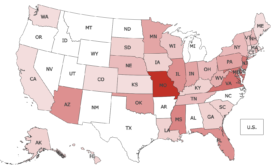 April saw an uptick in legislative activity surrounding public notice issues as many states approached the date they’re scheduled to adjourn. Press groups in Minnesota and Louisiana found themselves in scramble mode as public notice bills they opposed began moving. Although neither situation has been completely resolved, they appear to be headed in the right direction for residents of each state who care about government transparency.
April saw an uptick in legislative activity surrounding public notice issues as many states approached the date they’re scheduled to adjourn. Press groups in Minnesota and Louisiana found themselves in scramble mode as public notice bills they opposed began moving. Although neither situation has been completely resolved, they appear to be headed in the right direction for residents of each state who care about government transparency.
- Minnesota
In mid-April, the Minnesota Newspaper Association (MNA) went into overdrive to prevent school boards from being allowed to post notices of official proceedings on their own websites as an alternative to publishing them in local newspapers. MNA’s lobbying effort was focused on a provision amended into the Senate version of the legislature’s omnibus education policy bill supported by the Minnesota School Boards Association.
The House version of the education policy bill didn’t include a public notice provision until Alden Media announced in the first week of April it was closing eight newspapers in the state, leaving communities in three separate counties without a local paper. That impelled the House to add public notice language to the bill, although its version of the provision was limited to school boards in the communities that were losing their official newspaper. It was also designed as a temporary measure, with official-proceedings notices reverting back to a newspaper in 2026.
Both versions of the education policy bill passed and were referred to a conference committee to work out the differences. MNA began emailing its members on a daily basis, encouraging them to publish editorials and reach out to conference committee members to urge them to support the more-measured House version of the public notice provision.
“Our members engaged immediately. They were magnificent, just incredible,” says MNA Executive Director Lisa Hills. “They made phone calls, sent emails, published editorials and stories about the value of local papers. Their efforts were invaluable to our lobbying work.”
The campaign helped turn the tide. An April 26 announcement by CherryRoad Media that it was opening newspapers in two of the counties Alden had abandoned also helped. The situation is still fluid, but MNA says the conference committee has adopted the House’s time- and geography-limited version of the public notice provision. The final version of the education policy bill still needs to be approved by the conference committee and by each chamber of the state legislature.
MNA says a similar public notice provision has been amended into the House State Government Omnibus bill. That provision would apply to other political subdivisions aside from school boards. Hills says MNA engaged with key legislators to ensure the amendment includes language that is limited in both time and scope.
- Louisiana
Last year, Louisiana passed a law making it the first state to substitute newspaper websites for their print editions in the public notice process. But the new statute delayed the change until 2027. So when hearings were scheduled last month on a new public notice bill that would replace newspapers with government websites instead, Louisiana looked like it might pull a Florida. By “Florida”, we mean a state that passes consequential legislation updating its public notice system only to pull the rug out from under stakeholders by passing a different and worse bill the following year, scuttling the entire project.
Fortunately legislators in the Pelican State pulled back from the brink, substituting the original legislation with a different bill that mostly improves the state’s public notice laws.
Under current law, local-government notices are published in local newspapers while notices emanating from the legislative or executive branches must be published in a newspaper with a “audited paid daily circulation of not less than ten thousand … published in the city of Baton Rouge”.
 The original bill was introduced in March and started to move early last month. But after hearing from Louisiana Press Association (LPA) staff and members, the bill’s sponsor agreed to a compromise that would substitute his original bill with another piece of legislation relaxing eligibility requirements to allow more papers in the state to qualify to publish notices.
The original bill was introduced in March and started to move early last month. But after hearing from Louisiana Press Association (LPA) staff and members, the bill’s sponsor agreed to a compromise that would substitute his original bill with another piece of legislation relaxing eligibility requirements to allow more papers in the state to qualify to publish notices.
The substitute bill, House Bill 977, does that by:
– Reducing the time a newspaper must be published before qualifying to publish notices, from five years to two years (or one year in the case of “news deserts”)
– Allowing weekly papers to run certain multiple-insertion notices they’re presently ineligible to publish, and
– Expanding the pool of publications eligible to serve as the state’s Official Journal from a single paper — the Baton Rouge Advocate — to any paid-circulation newspaper in the state published at least once a week
HB-977 also includes a provision requiring official newspapers to include a statement in each notice revealing the cost of the ad, similar to a mandate passed in South Dakota in 2022. (Louisiana’s version of the mandate is more punitive, stipulating that newspapers can’t charge for the extra lines of type the statements require.)
The bill passed the House last week by a vote of 99-0. That wide margin suggests it’s likely also to pass the Senate, where it is scheduled to be referred this week.
- Other States
Iowa Gov. Kim Reynolds signed Senate File 2331 last month, making Iowa the 20th state to enact a law requiring newspapers to post all of their notices on their state press association’s statewide public notice site. The new law also requires publication free of charge on the newspapers’ websites and includes a provision reducing the time newspapers must be “regularly mailed through the post office of entry” to qualify to publish notices, from two years to one. As we noted earlier this year, SF-2331 was sponsored by a lawmaker who introduced a bill last year that would have completely eliminated newspaper notice.
In Tennessee, Gov. Bill Lee signed an odd, first-of-its-kind bill into law last month requiring notices published in newspapers to also be posted on a “news and information website, if available.” The bill was introduced by a legislator responding to a request from a constituent who owns a local radio station, according to Tennessee Press Association (TPA) Executive Director Mark Millsap. TPA agreed to support the measure after the sponsor accepted an amendment that defined a “news and information website” with language similar to the association’s membership requirements for local news websites.
If Maryland Gov. Wes Moore doesn’t veto it this week, as the MDDC Press Association has urged, a bill moving probate notices from newspapers to a government website will take effect on Oct. 1. House Bill 1258 requires the registers of wills in each county to “coordinate and establish and maintain a centralized website” to publish the notices. It passed both chambers of the legislature by wide margins.
